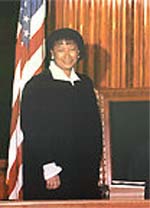
|
Further Right than Scalia & Thomas Justice Janice Rogers Brown: A Record of Ideological Extremism Political, Legal & Civil Rights Groups Oppose Her 'Poison Pen' People For the American Way
When Brown was nominated to the state supreme court in 1996, she was found unqualified by the state bar evaluation committee, based not only on her relative inexperience but also because she was "prone to inserting conservative political views into her appellate opinions" and based on complaints that she was "insensitive to established precedent." Brown's record since she joined the court confirms the accuracy of those concerns. Her many disturbing dissents, often not joined by a single other justice, make it clear that she would use the power of an appeals court seat to try to erect significant barriers for victims of discrimination to seek justice in the courts, and to push an agenda that would undermine privacy, equal protection under the law, environmental protection, and much more. Far from demonstrating the commitment to fundamental civil and constitutional rights principles that should be shown by all federal court nominees, Brown's record reveals a disturbing tendency to try to remake the law in a way that would undermine these crucial principles. In speeches as well as in some of her opinions, Brown has embraced the extreme states' rights and anti-federal-government positions of the Federalist Society, the organization of lawyers and judges working to push the law far to the right. What she has called the "Revolution of 1937," when the Supreme Court began to consistently sustain New Deal legislation against legal attack, was in her mind a "disaster" that marked "the triumph of our socialist revolution." This extremist anti-government position is especially outrageous for a nominee to the D.C. Circuit, which has primary jurisdiction for cases involving federal regulatory agencies. Brown has also been severely criticized concerning her judicial temperament and collegiality. Some of her dissenting opinions have been openly contemptuous of her colleagues. Sources on the court have reportedly stated that her fellow justices have privately complained about her "poison pen" and have called Brown a "loose cannon when she has a typewriter in front of her." Brown received a low ABA rating of "qualified/not qualified" for her nomination to the D.C. Circuit. This memo reviews some of the most troubling aspects of Brown's record and draws from a more in-depth analysis of her legal rulings published by People For the American Way and the NAACP. |
 California Supreme Court Justice Janice Rogers Brown's right-wing views have drawn opposition from the People for the American Way and NAACP
California Supreme Court Justice Janice Rogers Brown's right-wing views have drawn opposition from the People for the American Way and NAACP